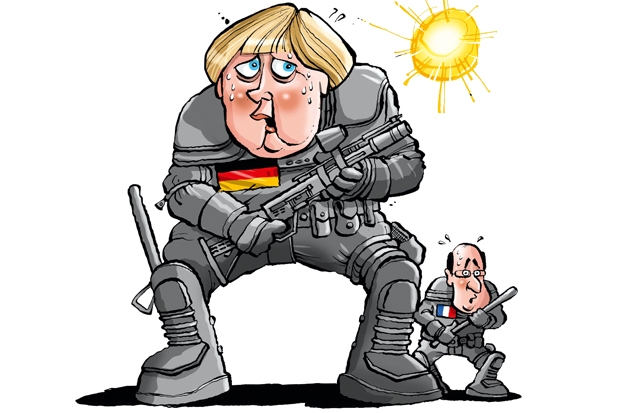German party politics has been overshadowed by yesterday’s atrocity in Berlin. But in light of this tragic event, which Angela Merkel has said was probably a terrorist attack, party politics actually matters more than ever. Increasingly, it seems next year’s Bundestag elections will be the defining event of 2017, not just for Germany but for Europe – and last week’s change of government in Berlin was a sign of things to come.
On the face of it, ‘Social Democrats take control of Berlin’s city council’ looks like an inconsequential story. Berlin has always been an SPD stronghold after all. However, there’s more to this story than meets the eye. Before September’s elections, Berlin’s Social Democrat Mayor, Michael Muller, presided over a ‘grand coalition’ of the SPD and the CDU – a local replica of Merkel’s national government. Now, he’s been reinstalled as Mayor of Berlin, but as the leader of a left-wing coalition of SPD, Greens and Die Linke.
The SPD have governed with the Greens many times, at every level, but this is the first time they’ve ever agreed to work with Germany’s far-left. Die Linke is a broad church – its members range from left leaning SPD refuseniks to unreconstructed communists. It’s a democratic party, but its philosophy is hardline socialist. No wonder the SPD never teamed up with them before. It’s like Tony Blair’s New Labour teaming up with the SWP.
As in so many European cities, last September’s Berlin elections were bad news for moderates, left and right. The soft-left SPD and the centre-right CDU both lost ground, chiefly to Die Linke and Alternative fur Deutschland. Of course the paradox of proportional representation is that although the election result is a fair reflection of voters’ views, the government that emerges is the result of backroom negotiations in which the voters have no say. AfD made the biggest gains, winning 231,000 votes (almost as many as the Greens or Die Linke) but no other party will work with them – for now. That left three potential coalitions. Eventually, after months of wrangling, Muller emerged as leader of a leftwing grouping of SPD, Greens and Die Linke.
Ostensibly, this coalition is a sign of the left’s increasing weakness. During the last half century, the SPD have governed Germany for 20 years. That they’re now reduced to making deals with former communists is a damning indictment of their shrinking power. However, for German leftists, this marriage of convenience could be the breakthrough they’ve been waiting for. In current polls, the CDU are polling in the low thirties, the SPD, in the low twenties. The Greens and Die Linke are both hovering at around ten per cent. The arithmetic is simple. In an alliance with the Greens and Die Linke, the SPD can defeat Merkel. Indeed, the SPD could have done so after Germany’s last national elections, in 2013 – but they refused to get into bed with Die Linke, and chose to prop up Merkel’s CDU instead.
The SPD still haven’t worked with Die Linke on a national level, but this local coalition in Berlin breaks a significant taboo. From now on, an SPD-Die Linke alliance is no longer inconceivable. Increasingly, leftwing politicians will be wondering: ‘if it works on a local level, why not on a national level too?’
For British politicians, left and right, the parallels are blindingly obvious. Even in the Thatcherite eighties, a Lib-Lab alliance would have had the electoral clout to defeat the Conservatives, if only they could have found a way to pool the Liberal and Labour votes in every seat. Labour has always been reluctant to embrace such a notion, but the rise of the SNP in Scotland and the rise of Ukip in northern England (plus impending boundary changes and comrade Corbyn’s leadership) has made a Labour majority impossible. Corbyn will never countenance a so-called ‘progressive alliance’ of Labour, Lib Dems and Greens, but the Richmond by-election showed that left-wing voters are quite capable of forming their own alliances, regardless of what their leaders say. Moderate Labour MPs will be watching Berlin’s Red-Green-Red coalition with keen interest. If it succeeds, they’ll be asking themselves a potent question: if Social Democrats in Germany can team up with former communists, why can’t the Labour Party team up with the Lib Dems?






Comments